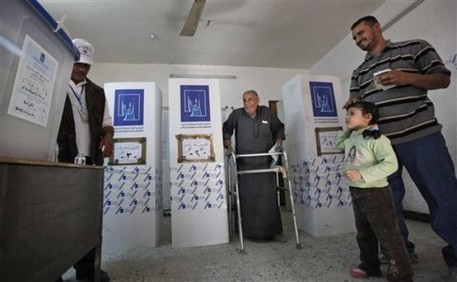
By Kirk H. Sowell
While partial results of Iraq's parliamentary election are now trickling out into Arabic media, they are not of sufficient reliability to make seat projections, but I have provided links to these â??exit pollsâ? below.
Iraqâ??s new parliament will have 325 members. Bearing in mind the ethno-sectarian breakdown of parliamentary seats is necessary to understand the countryâ??s balance of power:
Shia: 175-180
Sunni Arab: 75-80
Kurdish: 60
Minorities (Christians, etc.): 8
I derive these figures from the provincial seat allocations set by Iraqâ??s electoral commission. For mixed provinces, I derived a total by using the results of the January 2009 provincial elections as a baseline. In Baghdad, for example, Shia parties won 44 of 57 seats in 2009. With 68 seats for the parliamentary elections, my estimate of Shia seats up for grabs includes about 54 from Baghdad.
Below are the major blocs and political parties. Iraqâ??s electoral system requires parties to have a certain threshold in order to receive any seats - depending on the number of seats in the province - but allows parties to form blocs which add up their votes in order to ensure that they meet the threshold, and then divide the seats according to party agreement. Under the â??open listâ? system, voters are allowed to vote for individual candidates in addition to a list, but otherwise a blocâ??s seats are divided according to that agreement.
State of Law Coalition (Prime Minister Nuri al-Maliki)
Maliki is a Shia Islamist and his coalition is dominated by his Islamic Dawa Party, although it contains some Sunni Arab participation. Although State of Law contains about 40 parties, and has a number of prominent individuals running on it â?? including Oil Minister Hussein al-Shahristani â?? it is dominated by Maliki as an individual. Malikiâ??s political platform emphasizes Iraqi nationalism; a strong, centralized state with Shia Islamist ideology played down.
Iraq National Alliance (INA)
The INA, the formation of which was openly negotiated by Iran in 2009, is Shia Islamist and Malikiâ??s primary Shia rival. It is much less cohesive, with a number of important parties. The two most important are long-time rivals: the Islamic Supreme Council of Iraq (ISCI), and the Sadrist faction of Muqtada al-Sadr. ISCI was created by Iran and retains close ties to its progenitor, while the Sadrists have more nationalist roots but have accepted support from Iran in their fight against the United States. The nominal chairman of the INA is former prime minister Ibrahim al-Jaafari, who split from the Dawa Party after an unsuccessful party coup attempt against Maliki in 2007. He appears to have decided to throw his lot with Iran in a bid to get back into power.
Kurds
The Kurds are irrelevant in the contest between the Shia Islamists and Sunni Arabs and secular Shia during the election itself; Arabs vote for Arabs, Kurds for Kurds. But their approximately 60 seats will be important in forming a new government. The Kurds are closest to ISCI and thus the INA, and have had problems with Maliki, but their primary conflict is with Sunni Arabs.
Arab Opposition
What we may broadly refer to as the â??Arab Oppositionâ? contains an array of political blocs which contain almost all Sunni Arabs plus several secular Shia parties. As the ethno-sectarian breakdown described above makes clear, Sunnis cannot play a meaningful role in Iraqâ??s national government without allies who can win seats in Shia provinces. The most important of these blocs is the Iraqi National Movement led by former prime minister Iyad Allawi. While Allawi is secular Shia, his bloc is largely Sunni.
One obstacle Allawi faces is that while the Shia Islamists are divided into just two blocs, the opposition Shia parties are spread across four (including his). If Allawi fails to achieve the breakthrough in the Shia provinces he needs, this will be one of the reasons. And the Sunni Arab-Kurd conflict means that he needs to do quite well in Shia areas in order to form a government or even force Shia Islamists into a power-sharing agreement.
I will publish seat projections as data from independent sources becomes available. Reports currently published in Arab media suggest that Maliki is ahead overall and that Allawiâ??s bloc dominated in the Sunni provinces, but provide contradictory results from the Shia provinces. Arabic-proficient readers who want to read the partial results as they are published by partisan sources may refer to this Maliki website or ISCIâ??s Buratha News. I emphasize that independent sources have not yet published such precise results.
Kirk H. Sowell is an independent consultant based in the Washington D.C. area.
(AP Photo)











